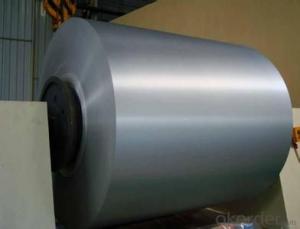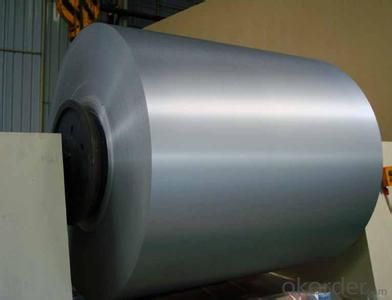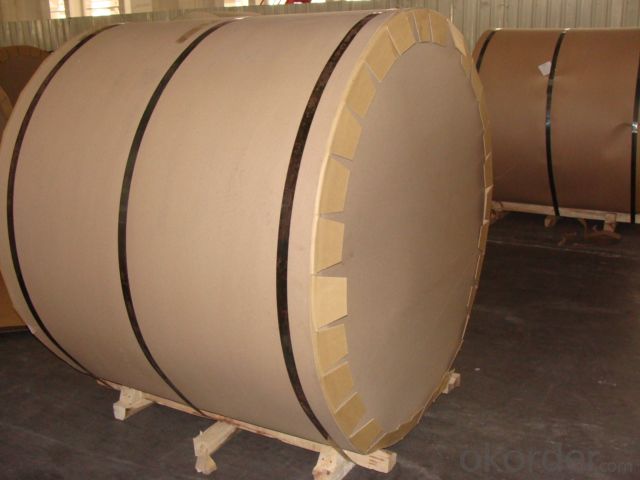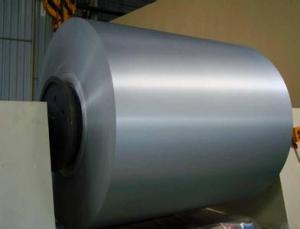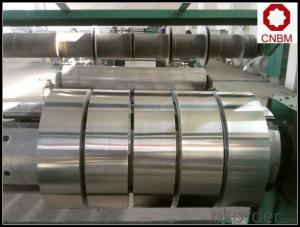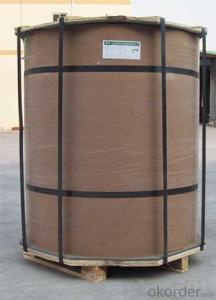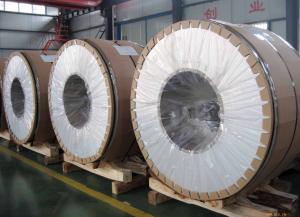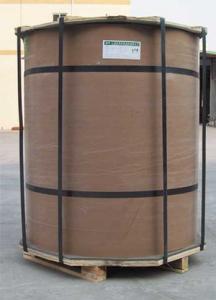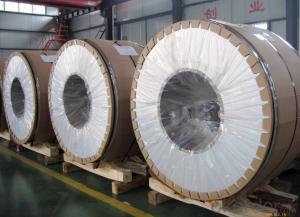5083 Mill-Finished Aluminum Coils 6xxx
- Loading Port:
- China Main Port
- Payment Terms:
- TT or LC
- Min Order Qty:
- 8 m.t.
- Supply Capability:
- 100000 m.t./month
OKorder Service Pledge
OKorder Financial Service
You Might Also Like
1.Structure of Mill-finished Aluminum Coils 6XXX Description
Mill-finished Aluminum Coils 6XXX has great ductility, heat conductivity, anti-corrosion and moisture resistance properties. We pay attention to the quality that it is free from Oil Stain, Dent, Inclusion, Scratches, Stain, Oxide Dicoloration, Breaks
Mill-finished Aluminum Coils 6XXX is widely used for PP cap stock, hot rolled thick plate, PS base plate, the traffic sign ,air-conditioner heat and exchangers, food container.
2.Main Features of Mill-finished Aluminum Coils 6XXX
• competitive price
• Reasonable and stable chemical composition
• Accurate tolerance
3.Mill-finished Aluminum Coils 6XXX Images
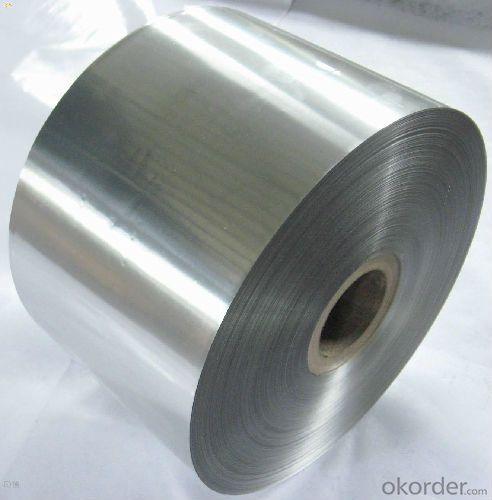
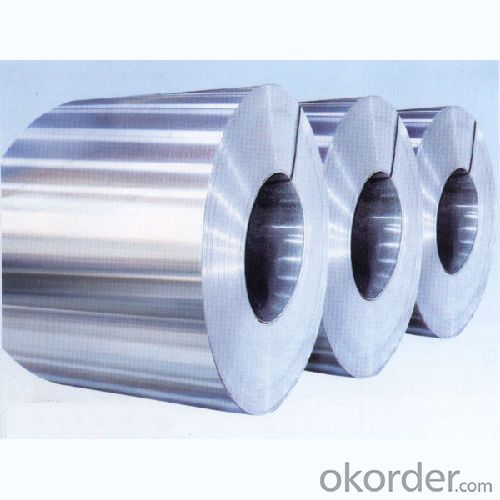
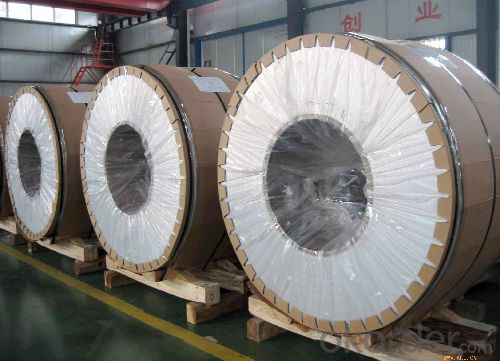
4.Mill-finished Aluminum Coils 6XXX Specification
Alloy | AA6xxx (AA6061 etc) |
Temper | T6 |
Thickness | 0.2mm -- 100mm |
Width | 30mm -- 1700mm |
Standard | GB/T 3880-2006, EN etc |
5. FAQ of Mill-finished Aluminum Coils 6XXX
A.How to guarantee the quality?
We can arrange a third party to test Mill-finished Aluminum Coils 6XXX. Before the shipment, we will test the products to ensure the quality is good.
B.When will you deliver the products?
The products will be delivered within 35 days after receiving original L/C or advanced payment.
C. Where have you exported this product?
It is exported to Africa, Middle East Asia and so on.
- Q: Can aluminum coils be used in refrigeration systems?
- Yes, aluminum coils can be used in refrigeration systems. Aluminum is a common material choice for evaporator coils in refrigeration systems due to its excellent heat transfer properties, corrosion resistance, and lightweight nature.
- Q: Are aluminum coils resistant to chemicals?
- Yes, aluminum coils are generally resistant to chemicals. Aluminum has excellent corrosion resistance and can withstand exposure to various chemicals, making it a suitable choice for applications that involve chemical processing or storage.
- Q: I have a diamond back bike with an aluminum frame. will it rust if i ride or put it in the frame? is it bad for the bike?
- sophisticated task. search onto a search engine. this can help!
- Q: Can aluminum coils, which are typically used for industrial purposes, be utilized for baking pizza?
- <p>Aluminum coils, commonly used in industrial applications, are not recommended for baking pizza. While aluminum is a good conductor of heat and can be used in baking, aluminum coils are often too thick and not designed for direct contact with food. They may also contain coatings or treatments unsuitable for food. Instead, use aluminum foil or a pizza stone designed for baking to ensure food safety and even heat distribution.</p>
- Q: Are there any specific installation requirements for aluminum coils?
- Yes, there are specific installation requirements for aluminum coils. When installing aluminum coils, it is important to consider a few factors. Firstly, it is crucial to ensure that the coils are properly supported and secured during installation. Aluminum coils can be quite heavy, so adequate support is essential to prevent sagging or damage. This may involve using appropriate brackets or support structures to ensure the coils are securely mounted. Secondly, it is important to consider the location and environment where the coils will be installed. Aluminum coils are often used in HVAC systems, and it is crucial to ensure that the installation area is free from any corrosive substances or chemicals that could potentially damage the coils. Additionally, proper ventilation should be provided to prevent any buildup of heat or moisture, which can affect the performance and lifespan of the coils. Furthermore, it is essential to follow the manufacturer's guidelines and recommendations for installation. This may include specific instructions regarding the type of fasteners or connectors to use, proper spacing between coils, and any other specific requirements for the particular aluminum coil being installed. Adhering to these guidelines will ensure the optimal performance and longevity of the coils. Lastly, it is highly recommended to have the installation of aluminum coils carried out by a professional who is experienced in handling and installing these components. This will ensure that the installation is done correctly, minimizing the risk of any issues or damage that may arise from improper installation. In summary, specific installation requirements for aluminum coils include proper support, consideration of the installation environment, adherence to manufacturer guidelines, and professional installation. Following these requirements will help ensure the optimal performance and longevity of the aluminum coils.
- Q: Aluminum inventory of the company, placed for a little longer, there will be surface oxidation, white spot shape, after cleaning into black spots, affecting the use of. Is there a better and convenient way to save it?
- 1. aluminum storage environment should be dry and bright, well ventilated, no corrosion climate.2. aluminum coil should try to avoid the leaks, snow.3. strengthen the management of rolling oil, its moisture content is controlled below zero point zero four percent.4. aluminum rolls should be packed in a sealed package and should be placed in the right amount of desiccant at the same time.5. do not immediately open the sealed package when it is transported from a low temperature zone into a region of high temperature and humidity.6. the humidity of the wooden shaft and box board of the packing box is not more than 18%, and the temperature of the color aluminum roll is not more than 45 degrees.7. aluminum rolls are prohibited from being stored with chemicals and moist materials during storage.
- Q: What are some common applications for aluminum coils?
- Aluminum coils are widely used in various industries due to their exceptional qualities and versatility. Some common applications for aluminum coils include: 1. Construction: Aluminum coils are extensively used in the construction industry for roofing, cladding, and insulation purposes. The lightweight nature of aluminum makes it an ideal material for these applications, as it reduces the overall weight of the structure and provides excellent resistance to corrosion. 2. Transportation: Aluminum coils are widely used in the automotive and aerospace industries. In the automotive sector, aluminum coils are used in the manufacturing of heat exchangers, radiators, and condensers. They are also used to produce lightweight body panels, reducing the overall weight of vehicles and improving fuel efficiency. In the aerospace industry, aluminum coils are used to manufacture aircraft parts, including wings, fuselages, and engine components, due to their high strength-to-weight ratio. 3. Electrical and Electronics: Aluminum coils are utilized in the electrical and electronics industry for various applications. They are commonly used in the production of transformers, motors, and generators, as aluminum has excellent conductivity and is lightweight. Aluminum coils are also used in the manufacturing of electrical cables, as they provide good electrical conductivity and are resistant to corrosion. 4. Packaging: Aluminum coils are extensively used in the packaging industry due to their excellent barrier properties. They are commonly used for packaging food and beverages, pharmaceuticals, and various other consumer products. Aluminum coils provide an impermeable barrier against moisture, oxygen, and light, ensuring the preservation and protection of the packaged goods. 5. Heating, Ventilation, and Air Conditioning (HVAC): Aluminum coils are widely used in HVAC systems for their excellent heat transfer properties. They are commonly found in air conditioning systems, heat pumps, and refrigeration units. Aluminum coils provide efficient heat exchange, ensuring effective cooling and heating processes. In summary, aluminum coils find common applications in construction, transportation, electrical and electronics, packaging, and HVAC industries due to their lightweight nature, corrosion resistance, excellent conductivity, and heat transfer properties.
- Q: This question asks about the maintenance difficulty of aluminum coils.
- <p>Aluminum coils are relatively easy to maintain. They are resistant to corrosion and do not require frequent cleaning or special treatments. Regular inspection for any physical damage or signs of wear is sufficient. However, it's important to keep them dry and clean to prevent any potential issues. For specific applications, such as in HVAC systems, regular cleaning may be necessary to ensure optimal performance. Overall, maintenance is minimal compared to other materials.</p>
- Q: How are aluminum coils annealed?
- Aluminum coils are typically annealed through a process known as heat treatment. This involves heating the coils to a specific temperature and then slowly cooling them down. The purpose of annealing is to soften the aluminum and improve its ductility, making it easier to work with. The first step in annealing aluminum coils is to clean them thoroughly to remove any contaminants. The coils are then placed in a furnace, which is heated to the desired temperature. The temperature and duration of the annealing process depend on the specific grade and thickness of the aluminum being treated. Once the coils reach the desired temperature, they are held at that temperature for a predetermined amount of time. This allows for the internal structure of the aluminum to become more uniform and relieves any internal stresses that may have developed during the manufacturing process. After the annealing process is complete, the coils are slowly cooled down in the furnace. This slow cooling is important to prevent the formation of any new internal stresses. Once the coils have cooled to room temperature, they are ready for further processing or use. In some cases, a process known as quenching may be used after annealing. Quenching involves rapidly cooling the aluminum by immersing it in a quenching medium, such as water or oil. This can help to further improve the mechanical properties of the aluminum, such as its strength and hardness. Overall, the annealing process for aluminum coils is a carefully controlled heat treatment that aims to improve the metal's properties and make it more suitable for various applications.
- Q: Calculate the specific heat of aluminum (in calories).mass of aluminum25.0 gmass of water23.2ginitial temperature of aluminum98.0Cinitial temperature of water20.0Cfinal temperature of water33.0Cround to three decimal places, do not include units.
- Heat gained by water = heat lost by aluminum Heat = H mass = m specific heat =c change in temperature = dT H = mcdT mcdT for water = mcdT for Al (23.2)(1.00)(13) = (25.0)(c(Al))(33-98) c(Al) = (23.2)(1.00)(13)/(25.0)(65) = 0.186 This value is just a bit below the known value of specific heat for aluminum, where c = 0.217 cal/g.C
Send your message to us
5083 Mill-Finished Aluminum Coils 6xxx
- Loading Port:
- China Main Port
- Payment Terms:
- TT or LC
- Min Order Qty:
- 8 m.t.
- Supply Capability:
- 100000 m.t./month
OKorder Service Pledge
OKorder Financial Service
Similar products
Hot products
Hot Searches
Related keywords
